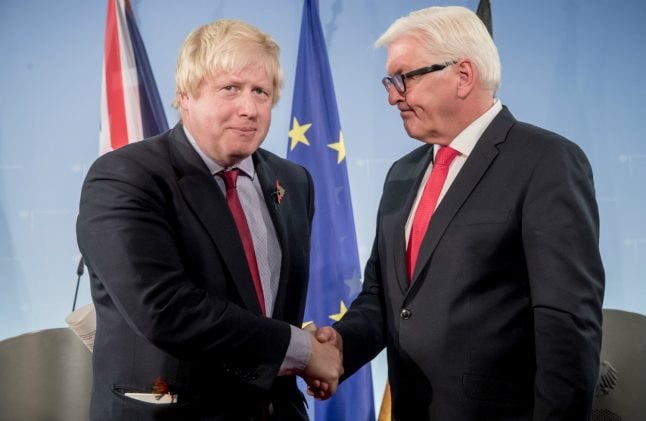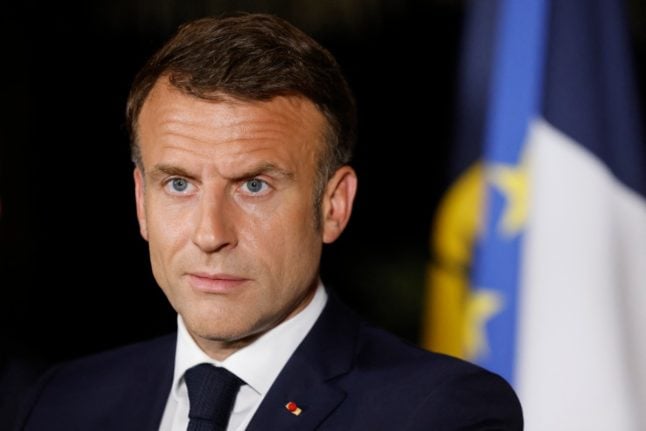Johnson had long been the favourite to win the Conservative leadership race ahead of Jeremy Hunt and will take over as the head of the UK's government on Wednesday.
But the decision will leave many Germans scratching their heads as they wonder how the UK has come to have a leader that leading German news show Tagesschau describe as a “cocky troublemaker”.
In an opinion piece published on Spiegel Online on Tuesday, Jörg Schindler wrote: “He's been dreaming of this for decades.
As Johnson, dubbed “Brexit-Boris” by Germany's top selling daily newspaper Bild, prepares to enter 10 Downing Street, commentators in Germany have raised strong doubts over his ability to get the UK out of Brexit deadlock.
The former London mayor has promised to seek a new deal with the EU or leave without an agreement on October 31st, the current scheduled withdrawal date, in what would be a ‘no-deal' Brexit.
READ ALSO: 'A giant liar with a mop of hair': What the French think of Boris Johnson
But the British parliament has rejected a withdrawal deal reached by outgoing PM Theresa May and the EU three times.
Johnson claims he can land a new deal which can pass parliament, but the EU has consistently said the agreement is final and cannot be reopened for further negotiations.
“Europe is in for a turbulent autumn,” wrote Schindler in the latest issue of Spiegel magazine, adding: “Johnson may have inexhaustible charisma, but he doesn't have a plan – only an apparently unshakable belief in himself. But how far will that take him?”
If the words seem a tad harsh then the pictures are even more cutting. On the cover, Johnson has been transformed into Alfred E. Neumann, the fictitious character of the American satirical magazine MAD, a worldwide symbol of boundless stupidity.
Der neue @DerSPIEGEL. pic.twitter.com/mPZCMQY7Re
— Jonas Leppin (@JoLepp) July 19, 2019
Next to it are the words: ‘Mad in England – How Boris Johnson turned the British against Europe.’
“History is repeating itself,” wrote Schindler. “The country that gave birth to modern democracy now seems willing to elect a populist born in New York who has made his peculiar hair his trademark and who, as a member of the elite, is now agitating against them – and who feels like he is destined for greatness.”
Johnson is often compared to the US President in German media.
Bild published a list of things to know about the new British PM, including a bullet point about his “hairstyle-doppelgänger (lookalike)”.
Nachfolger von Theresa May – Jetzt kommt Brexit-Boris! https://t.co/H0PkOl6jiM
— BILD (@BILD) July 23, 2019
“Johnson not only has the same birthplace as Donald Trump, but also a very similar hairstyle,” Bild wrote. “Both are blond. But while the Trump quiff always stays in place, Brexit-Boris' hair sometimes swirls wildly around.”
 A float during Colonge's carnival celebrations depicting Brexit. Photo: DPA
A float during Colonge's carnival celebrations depicting Brexit. Photo: DPA
It’s not surprising that EU-bashing Johnson is not particularly well-favoured in Germany, a country where the majority of people are pro-European.
In a commentary piece for Deutsche Welle, Christoph Hasselbach described Johnson, often called BoJo, as a “rogue” and a “foreign object”, saying German politicians are “stunned by the Boris Johnson phenomenon”.
Hasselbach said Theresa May came from a similar political world as German politicians, where reasonable compromises are the norm. Not so for her replacement.
“Boris Johnson is the antithesis, and he makes Berlin politicians as speechless in the same way as Donald Trump,” said Hasselbach.
Hasselbach wrote that Johnson’s plan for Brexit “will of course go wrong and Britain will remain isolated and impoverished”.
“There is no doubt about that in Germany they are looking forward to the moment when Johnson and the misguided half of the British population will see exactly that,” he added.
Unimaginable in Germany
In fact, the very idea of a person like Johnson gaining such power is unimaginable in Germany, commentators say.
'There could never be a German Boris Johnson’ was the headline of a recent column by journalist Nick Cohen for the Spectator, which was also published in German daily Die Welt.
READ ALSO: 'He looks like a man who slept in his car': What the Danish media thinks of Boris Johnson
“If an ambitious German were to affect the style of a junker, he would be greeted with incomprehension,” Cohen wrote.
“Prussia no longer exists. With the Second and Third Reich, its ruling class discredited and destroyed itself. Britain, by contrast, appears to be a lucky country. Fascists never took power, and its ruling class was never disgraced by collaboration. Communists never took power and seized their wealth. Our old order can still appear cuddly rather than sinister.”
Berlin daily the Tagesspiegel called BoJo “a prime minister without a plan – but with great ambitions”, highlighting his climb to the top.
In the commentary, Albrecht Meier gave a similar damning report to other publications. He said: “The newly inflamed love between the conservative base and the blonde power politician says a lot about the state of British politics.”
Meier said Johnson clearly has no “proper plan” on how the negotiations with the EU over Brexit should be structured.
“His strategy: hoping for the EU to collapse,” Meier wrote.
It's not just newspapers that have raised concerns about Boris. The centre-left Social Democrats (SPD) poked fun at the politician and Brexit in its campaign ahead of the European Parliament elections which took place in May.
Was passiert, wenn Populisten mitmischen: Chaos. Unsere Botschaft an die britischen Bürgerinnen und Bürger ist klar: Die Tür für euch bleibt offen. Großbritannien gehört für uns zur Europäischen Union. #Europaistdieantwort #brexit pic.twitter.com/V90PsEBDJs
— Lars Klingbeil ?? (@larsklingbeil) March 28, 2019
“Brexit?” one of their posters read, with a picture of Johnson dangling in the sky carrying Union Jack flags and looking helpless. “Europe is the answer,” it continues, adding: “Come together.”



 Please whitelist us to continue reading.
Please whitelist us to continue reading.
Member comments